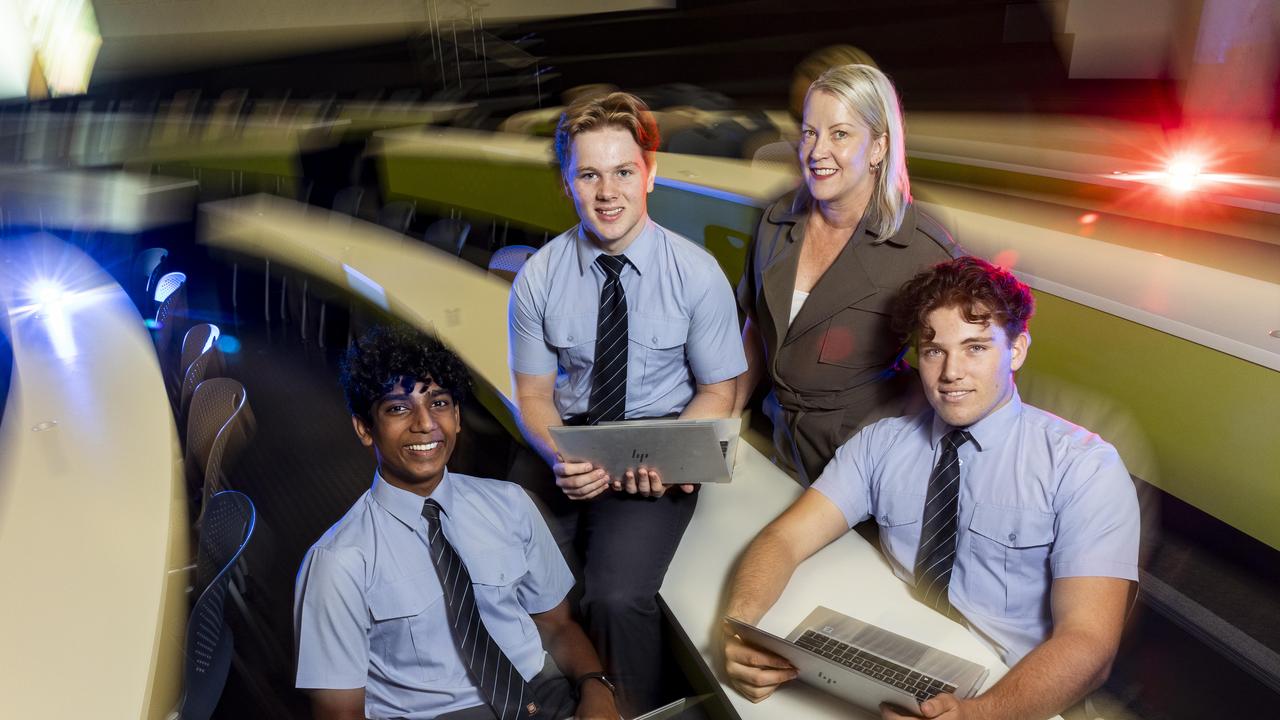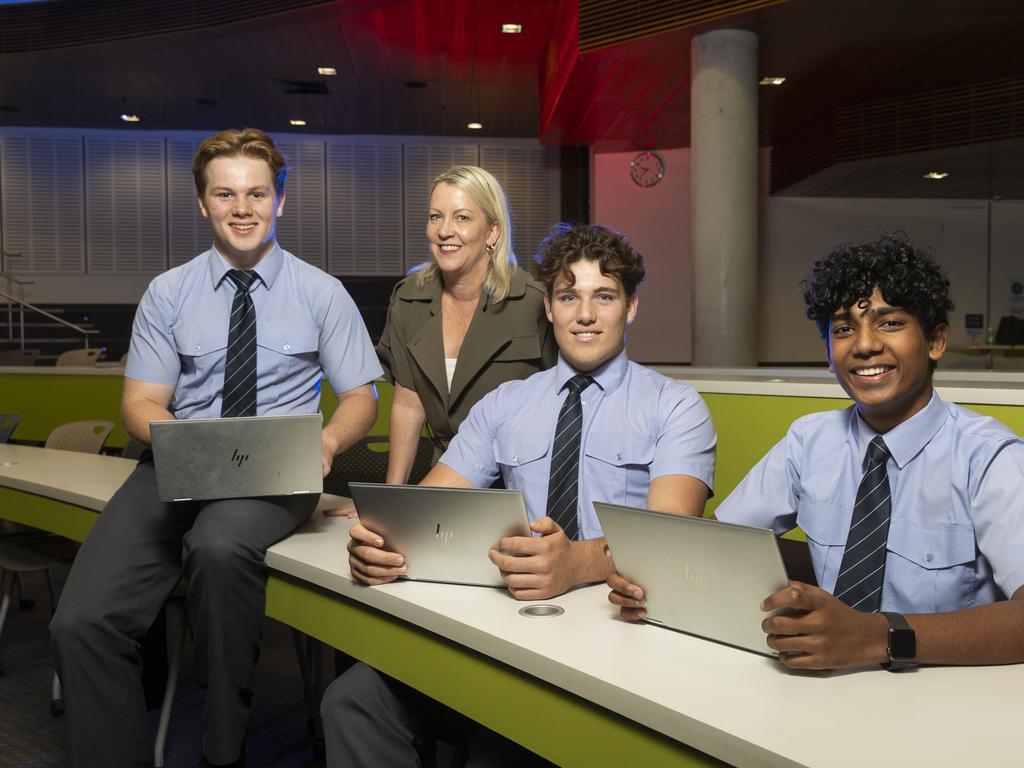Brisbane’s elite colleges embrace the age of artificial intelligence
It’s the biggest technological advancement since the scientific calculator and the internet, but Brisbane’s leading teachers say it’s just the “tip of the iceberg

Education
Don't miss out on the headlines from Education. Followed categories will be added to My News.
From surviving an AI apocalypse, to music students creating a DJ’s playlist and a Macbeth-themed Chatbot exam study buddy, Brisbane’s elite colleges are embracing the age of artificial intelligence.
It’s the biggest technological advancement since the scientific calculator and the internet but some of Brisbane’s leading teachers say it’s just the “tip of the iceberg”.
They say it will revolutionised classrooms from English, history, design to music lessons in a major time saver for teachers and students.
The insist that AI will not replace teachers or how teachers interact with students – but when used ethically can be a game-changer.
Here are how four of Brisbane’s biggest private schools have launched into AI.
Brisbane Grammar School
The Spring-Hill school is set to open a $70 million precinct dedicated to science, technology, engineering, art and mathematics early next year, with AI to be part of the offerings.
The university-calibre building includes new laboratory spaces and studios that have been designed to foster collaboration and creative thinking among students, supported by innovative technology.
Director of STEAM Tanya Nielsen said it will be complete with soundproof podcast studios and design hubs to create and test 3D printing and prototypes.
“Our focus has been on adapting our learning and teaching to better prepare our students for the demands of the industry, that is now more sophisticated, especially with the rise of AI,” Ms Neilsen said.
Ms Neilsen said AI would not replace teachers or replace teachers’ relationship with students but when used correctly could essentially act as a “personal assistant”.
She said it could be used as a “co-pilot” to create stimulus for the likes of English, arts or drama classes and help reduce workloads, particularly for administrative tasks.

Grammar’s Year 7 and 8 student this year used AI in a trial program of an “AI apocalypse” which encouraged critical thinking outside of the classroom norms.
Ms Neilsen said they used AI as a problem solving tool.
“We put a provocation to the students that they were in an apocalypse, essentially that AI had taken over,” Ms Neilsen said.
“So the problem that was put on students was all about what do we value now? Yes it’s all fictional but it made them think about the positive and negative implications of AI.
“The students got to produce a video and used generative text from AI as the stimulus for the story telling. Students are still the maker but AI makes it so much faster.
“They loved it. And the engagement levels were so high.”
Brisbane Boys’ College
BBC’s head of English Max Forbes said Year 12 students had used a customised AI chatbot to great effect last weekend in studying for Monday’s external exam.
Mr Forbes said the chatbot was designed around Shakespeare’s Macbeth and was aligned to everything the students would be taught by BBC staff.
“We can track the word count and in two days the word count was 60,000,” Mr Forbes said.
“A traditional big organisation’s customer service chatbot will use about 100,000 words a month of dialogue. So it showed that our boys got real value out of it.”
Mr Forbes said the college was starting to play around with the more creative aspects of AI, particularly around AI-generated images.
“One other thing we looked at is creating an ad campaign as a form of the visual aspect. It’s very real world.”
Mr Forbes said the education industry was at the “tip of the iceberg” of AI.
“This is only the beginning of it. It will grow and grow from here and we are going to see a real shift in the way we educate,” he said.
St Paul’s School
St Paul’s head of learning, David Fenwick, said AI could accelerate the learning process but also empower students to explore coding in a revolutionary way.
Mr Fenwick said a custom AI program would assist students to work out how pieces of code could work together in innovative ways.
“This approach enables them to craft new programs, algorithms, concepts and products in ways that wouldn’t be obvious if they were following a textbook,” Mr Fenwick said.
“Additionally, by integrating AI into their learning process, students can work faster and are inspired to think outside the box.”
One example of a Year 11 student used AI to design a web application that enabled users to register and login, create events, search for songs and create a playlist that can be accessed by the DJ of the event.
“Our aim is to provide students with a dynamic learning experience that nurtures both their technical and creative skills,” he said.
“With AI as a collaborator, we’re guiding them towards becoming digital pioneers, capable of bringing new and groundbreaking ideas to life.”
Brisbane Girls Grammar School
Girls Grammar students and teachers interact with AI tools daily and explore its potential across several subjects including history and English.
In a statement, the school said it aimed to educate students to harness the tools ethically and discerningly” while being aware of the platforms’ ongoing development.
Next year, the school will also review its current academic guidelines to support AI learning in alignment with the new national framework.
How students and teachers are using it:
Senior History students are taught how to prompt LLM tools as a starting point for research
into historical events or perspectives: e.g. Who are the key historians on a particular topic?
What are the most important primary sources?
English teachers model how LLMs could be used to find excerpts from texts such as Jane
Eyre, and then discuss how to verify accuracy and relevance of the information.
Technologies students use generative AI tools to render prototypes for potential designs.
Students in various disciplines use AI to generate quizzes to test each other’s knowledge.
More Coverage
Read related topics:Private schools






